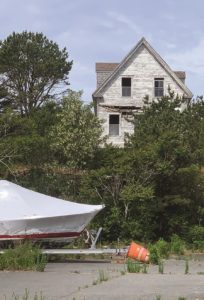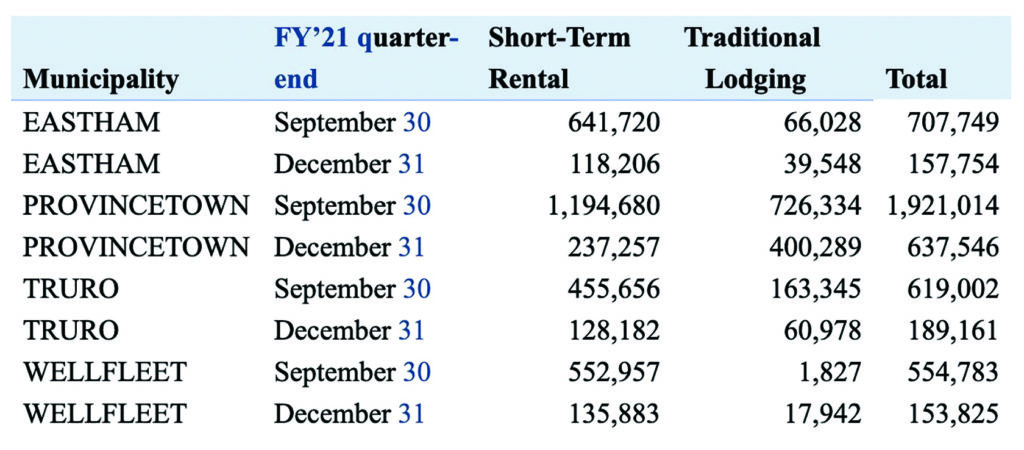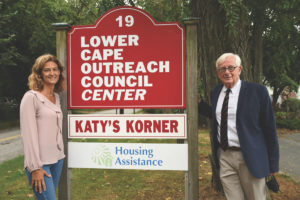PROVINCETOWN — State Sen. Julian Cyr and Cape Cod Chamber of Commerce CEO Wendy Northcross convened a panel of housing experts last week that focused on what individual towns can do about the housing crisis.
“I am really pushing the 20 communities I represent in the Cape and Islands to commit to a fundamental reimagining of what we are willing to do on housing,” said Cyr. “If we don’t, we will not have sustainable year-round communities. It’s really incumbent on local officials, region-wide, to recognize our own agency in solving this crisis.
“There are some policies we can take up and pass on Beacon Hill that will make a difference,” added Cyr, “but, broadly, this is a problem that will be solved — or not — based on actions taken at the municipal level.”
“Our people are being depleted,” said Northcross. “They are leaving the Cape, they are moving to Maine, because they can’t stay here.” The business community is worried, Northcross said. “You are going to be hearing more in the coming weeks and months from the Cape Cod Chamber, because the lack of housing is crushing our small businesses.”
The panel, conducted by phone, included Hadley Luddy of the Homeless Prevention Council, Philippe Jordi of the Island Housing Trust on Martha’s Vineyard, Nantucket Housing Director Tucker Holland, and Chris Flanagan of the Homebuilders and Remodelers Association of Cape Cod.
They called for multiple strategies, including action on funding, housing production, zoning changes, and conversion of underused properties.
“The problem is very well documented,” said Northcross. “What I want to talk about is the way forward.”
Dedicated Funding Streams
A common starting point for many of the housing experts on the panel was the need for specific, dedicated funding streams for housing initiatives.
“We fought like heck to get short-term rental tax parity,” said Northcross. “Now it outweighs what hotels are generating — it’s actually dwarfing those numbers. That is newfound money for our communities, and it needs to be directed into some kind of housing fund, protected from other uses.”
In an interview, Jay Coburn, CEO of the Community Development Partnership, agreed. “I think all of that short-term rental tax money should be used for housing purposes,” he said, unless opponents of using it all can articulate “compelling needs that can’t be met with other sources.”
“Let’s be real,” Coburn added. “It’s the short-term rentals that are the number-one driver of our housing affordability problem. We ought to be using the taxation of them to help solve that problem.”
Jordi of Martha’s Vineyard and Holland of Nantucket both argued for a real estate transfer tax on residential homes that sell for more than $2 million. Such a tax is already allowed for the purposes of funding municipal land banks for conservation purchases, but to set up a transfer tax for housing would require an act of the state legislature. Provincetown and Nantucket have repeatedly asked the legislature for such legislation, and Wellfleet is considering a similar measure at this Saturday’s town meeting.
“In terms of raising the necessary capital, it’s not going to just fall off the back of a truck,” said Jordi. “The median sale price has increased by 58 percent on the Vineyard since 2019. We need to capture some of that value and put it back into the community in a way that is going to maintain the viability of the community.”
Coburn pointed out that local funding is especially needed for housing efforts aimed at middle-income people. “There are a lot of different pots of state and federal money,” he said, “but they really start to dry out at 60 percent of Area Median Income.”
If towns want to secure housing for people who earn 80 to 120 percent of Area Median Income (AMI), they won’t be able to count on federal money to get the job done, Coburn said. Barnstable County’s AMI for 2021 is $77,750 for a two-person household.
Housing Production
“We need many more projects on the scale of what Patrick Patrick is doing, or Harbor Hill, or Cloverleaf,” said Cyr. “Actually, you need them much bigger. We need to see 100 units at a time.”
Patrick’s proposed building in Provincetown is for 16 year-round rental apartments and 112 dormitory-style seasonal beds. Harbor Hill, also in Provincetown, includes 28 year-round rental apartments, and the Cloverleaf plan approved in Truro is for 39 year-round apartments.
New development isn’t easy on the Outer Cape, though, when so much land is already developed or is preserved in park or conservation land. Luddy of the Homeless Prevention Council raised the idea of redeveloping or winterizing older motels for habitation. In Yarmouth, a developer is working on a plan to convert the 128-room Cape Cod Irish Village motel into a 120-unit retirement community.
On Nantucket, a developer wants to build 156 condominium apartments at Surfside Crossing, said Holland of the Nantucket Housing Office.
“Their original proposal met with strong opposition,” said Holland. “The developer is appealing a ZBA decision now, but they’ve also changed their formula. Twenty-five percent of the units are affordable-ownership, as before, but they’re now proposing that another 25 percent be, I guess you would call it ‘market-rate,’ but with a year-round restriction.
“This is kind of new ground — a year-round-only deed restriction, without an income restriction associated with it,” said Holland.
Trading deed restrictions for project approvals is not an entirely new strategy. In Provincetown, Patrick agreed to a “covenant deed restriction” when he requested nearly 10,000 gallons of sewer capacity for his dormitory project. The 16 apartments in that building are rentals, however.
“We really are talking about creating a bifurcated market — a pool of year-round-only market properties, and then regular market properties,” said Holland. “We don’t need more short-term rental options out here. We need year-round housing.”
Trusts, Deed Restrictions, Incentives
Nantucket is also working on a land trust model in which the town would buy the land underneath a property, and an individual or family would buy just the building standing on it.
This would allow the town to impose a permanent year-round occupancy restriction and be in a position to see that it’s enforced, Holland said. It would also make the purchase more affordable for those buying the home.
Coburn said he has seen this approach work. “In fact,” Coburn said, in Provincetown “there are some units on Nelson Avenue that were done by Ted Malone on land that’s owned by a housing land trust.” Coburn has also studied the nonprofit Champlain Housing Trust use of this model.
One other idea floated by the panel: a town could try buying year-round-occupancy deed restrictions on properties that are currently rentals. An elderly landlord, for instance, might be willing to accept cash now in exchange for restricting the use of a property for decades to come.
That’s something Kristin Hatch of the Provincetown Housing Authority would like to see happen, she told the Independent. “I’ve said for years that the town needed to approach folks like Napi Van Dereck, who housed a whole lot of longtime year-round people,” she said. “The town didn’t do it.” Van Dereck died 18 months ago, at age 87.
“What incentives can we do for the existing landlords we have?” asked Cyr. “If people agree to keep the property in some sort of restriction for a certain period, could we pay their sewer betterment? Could we discount their property taxes even further? How can we preserve those properties as year-round affordable rentals in some way?”
Vacancy Fees
There is also the thorny problem of residential property that is left empty and decaying. How these might be seen as assets to devote to affordable housing was not discussed by the panel.

“We can’t force anyone to redevelop — we can just ensure it’s not a public safety hazard,” said Provincetown Assistant Town Manager David Gardner.
There are decaying residential units scattered around the Outer Cape. One such parcel, owned by the late Chuck Silva and his wife, Helen Silva, at 39 Ship’s Way in Provincetown, has nine buildings on it containing 23 apartments — nearly as many units as Harbor Hill. All of them are empty, and at least one of them is open to the elements. Last year, Provincetown’s water dept. confirmed that, while there are still “active service accounts,” there is no water usage at the property.
“Some communities in Massachusetts have a vacant property bylaw,” said Gardner. They can actually charge an annual fee as an incentive to do something with the property.
A Drumbeat of Sales
The discussion about action is taking place against a steady drumbeat of properties selling. “We get calls on a daily basis,” said Luddy of the Homeless Prevention Council. Callers say, she reported, “my rental is sold, and I have to be out in 30 days. Where can I go?”
When properties in resort communities sell, the market price is largely defined by the potential to earn revenue from short-term rentals. Someone who wants to buy or rent a house to live in full-time is essentially bidding against its value as a hotel room. It’s a hard contest for local incomes to win.
Still, there does not appear to be a strong call for direct regulation of the short-term rental market. The state law that established the short-term rental tax in December 2018 also includes provisions that allow municipalities to cap the number of short-term rentals in their towns or to draw a zoning map that would exclude short-term rentals from certain districts or to limit the number of days per year a property can be rented short-term. No towns on the Cape or Islands have made use of these provisions, however.
Cyr said he is skeptical those steps will be effective, because “people are going to go around it.
“We saw this in the pandemic, when short-term rentals weren’t allowed last spring,” Cyr said. “If you rent it for a month and a day, you get around any restrictions that the law has.”
“The role of government is to regulate the market,” said Coburn. Unbridled capitalism has unintended consequences, he said. But so would banning short-term rentals. “If people don’t have income coming in and can’t keep up with their mortgages — I don’t think we want to crash real estate values,” said Coburn.
At this point, it would seem, market forces are making short-term rental, technically, at least, the “highest and best use” of residential property.
Cyr’s call to action makes clear that reserving some units for actual residential use is on Cape Cod’s agenda now. With what tools and what funding, and on what timeline, is our post-pandemic problem.
Editor’s note: Because of a reporting error, an earlier version of this article misidentified the director of the Nantucket Housing Office. He is Tucker Holland, not “Hammond.”


